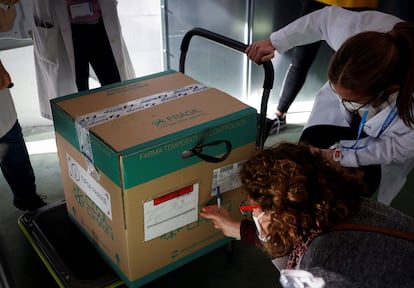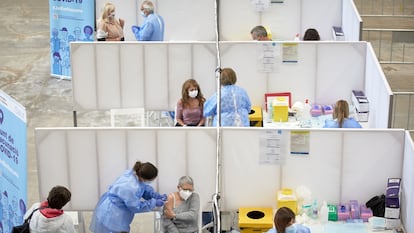The Janssen dilemma: vaccinate the over-30s by July or take extreme precautions due to the tiny risk of blood clots?
The decision over what to do with millions of doses of the one-shot vaccine has divided Spain’s regions. Madrid, Galicia and the Canary Islands, for example, are calling for the medication to be used on the under-60s

The Covid-19 vaccination campaign has reached cruising speed in Spain. With the immunization of the over-80s nearly complete, and half of the country’s septuagenarians and 40% of the 60-69 age group having got their first dose, all of the over 60s could be protected between the end of May and start of June should the expected doses arrive. Now the health authorities will have to decide on what will happen for the under-60s, and with vaccines such as that of Janssen – being a single-shot vaccine, it could speed things up even further. But according to the current plans, it won’t be used for the under-60s. Some regions are calling for a change to the guidelines, while others are hesitant given the tiny risks of blood clots that have been associated with the medication.
The Health Ministry on Wednesday distributed the first 148,000 doses of Janssen to the regions, which are in charge of their own vaccination campaigns as well as the overall controls aimed at keeping the pandemic in check. The quantity of the vaccine delivered to Spain will rise in May and June, with more than five million doses due to arrive. According to the current vaccination strategy, the shots will be used for 70- to 79-year-olds, although Health Minister Carolina Darias said this week that these shots will be “prioritized but not limited” to this age range.
The Health Ministry data shows that 6.1 million people aged between 50 and 59 are still left to be vaccinated, and nearly 16 million people aged 25 to 49
Estimates put together for EL PAÍS based on the ministry data, however, show that more than three million Janssen doses will be left over once this group, as well as the 60-to-69 age group, have been inoculated. The initial plan was to use the Oxford-AstraZeneca vaccine for that range, but the updated strategy published this week by the Spanish government opens the door to the use of other vaccines once the inoculation of older citizens is complete.
The Health Ministry data shows that 6.1 million people aged between 50 and 59 are still left to be vaccinated, and nearly 16 million people aged 25 to 49. Darius has announced that from May onward, Spain will receive 1.7 million doses of the Pfizer-BioNTech vaccine every Monday, which is half a million more than the current weekly delivery. Taking into account the speed with which the Pfizer vaccines are currently arriving – and in lesser quantities, those of Moderna and AstraZeneca – the use of the Janssen doses would allow for both groups to be completed as early as July, according to estimates made by this newspaper. That’s to say, the entire population in Spain aged over 30 could be vaccinated by the middle of the summer.
What to do with these three million doses, to which another 12 million must be added between the months of July and September, is something that has begun to divide the regions, as was evident during the Public Health Commission meeting this week, according to various sources who were present.

Regions such as Madrid, Galicia and the Canary Islands want to administer these Janssen doses to the under-60s (the remainder opted not to take a public stance, apart from Andalusia, who called for the decision to be “voluntary”). This position is in line with the recommendations made by the European Medicines Agency (EMA), which has found that the benefits of the vaccine outweigh the risks of blood clots related to the vaccine (around one for every million doses).
“That’s how half of the regions see it,” explains a source from a territory that wants to make the current strategy more flexible, given that it limits the use of Janssen to the over-60s. “This would allow for herd immunity to be reached quicker and also reduce the impact of the pandemic from the first half of the summer by a great deal.”
Other regions, meanwhile, were more cautious at the meeting this week. “There is a certain fear as to there being an episode of blood clots and no one wants to carry that responsibility,” says another source who is familiar with the recent conversations. The Health Ministry, meanwhile, has declined to offer its view on the proposal.
Amós García-Rojas, the president of the Spanish Vaccinology Association and member of the group of experts that is advising the government, explains that the normal approach would be for the Janssen vaccine to have the same criteria as those applied to the AstraZeneca medication, given that they are similar in terms of their characteristics and that these very rare side effects have been detected in the under-60s. As such, he believes that the likely approach will be to continue with the Janssen vaccine in the 60- to 69-year-olds once the over-70s are completed, but not to lower the age range for the medication afterward. “At least with the knowledge that we have today,” he argues. “Perhaps when all of the over-60s are vaccinated we will have new evidence on the adverse effects that will allow for other decisions to be made,” he adds.
While there is capacity for vaccination and there are no doses left over from other manufacturers, the priority should be to move as fast as possibleFederico Martinón, head of the Pediatric Service at the Hospital Clínico Universitario in Santiago
Federico Martinón, the head of the Pediatric Service at the Hospital Clínico Universitario in Santiago and an expert in vaccines, believes that the priority should be to administer the highest number of vaccines as soon as possible, and he recommends analyzing the situation when it is time to begin on the under-60s. “If we know more about the adverse effects, for example, if it is confirmed that these blood clots, which are very rare, are more common among women, perhaps this could be taken into account,” he argues. “But all of the supranational regulatory agencies have ratified that the benefits of vaccines such as the Janssen or the AstraZeneca will outweigh the risks. While there is capacity for vaccination and there are no doses left over from other manufacturers, the priority should be to move as fast as possible,” he says.
While Martinón recognizes that the individual risk for the under-60s is much lower than for people older than that age, he insists that moving along with the vaccination campaign is key to ending the pandemic. “On the one hand, we avoid infections and the risk that variants could appear. The quicker we reach a high percentage of people vaccinated, the better. On the other, we have to take into account that re-vaccination [with a third dose for people who already have immunity] will be needed, because the evolution of the virus will make the vaccines ever-less effective. Right now it is appropriate to immunize the highest number of people, because if not, we could find ourselves in a situation whereby we have to re-vaccinate the most vulnerable people [the elderly, above all] when we still haven’t finished with the youngest groups,” he adds.
The debate is of great significance. Is it legitimate to slow down a vaccination campaign, which would cause more cases, more hospitalizations and some deaths in order to avoid some hypothetical cases of thrombosis? In the United Kingdom, which has already started to relax coronavirus restrictions after having vaccinated half the population with at least one dose, they have followed the advice of their medicines regulator, which is similar to what the EMA has said: the benefits of any of the available vaccines outweigh the risks. As a result, the UK is using Janssen on the over-30s. Doses of the AstraZeneca and Janssen vaccines will not be used on anyone younger than that age, given that due to the low probability of someone from this group has of getting seriously ill or dying from Covid-19, the risks associated with these shots, while tiny, do not compensate the benefits provided on an individual basis.
English version by Simon Hunter.
Tu suscripción se está usando en otro dispositivo
¿Quieres añadir otro usuario a tu suscripción?
Si continúas leyendo en este dispositivo, no se podrá leer en el otro.
FlechaTu suscripción se está usando en otro dispositivo y solo puedes acceder a EL PAÍS desde un dispositivo a la vez.
Si quieres compartir tu cuenta, cambia tu suscripción a la modalidad Premium, así podrás añadir otro usuario. Cada uno accederá con su propia cuenta de email, lo que os permitirá personalizar vuestra experiencia en EL PAÍS.
¿Tienes una suscripción de empresa? Accede aquí para contratar más cuentas.
En el caso de no saber quién está usando tu cuenta, te recomendamos cambiar tu contraseña aquí.
Si decides continuar compartiendo tu cuenta, este mensaje se mostrará en tu dispositivo y en el de la otra persona que está usando tu cuenta de forma indefinida, afectando a tu experiencia de lectura. Puedes consultar aquí los términos y condiciones de la suscripción digital.








































